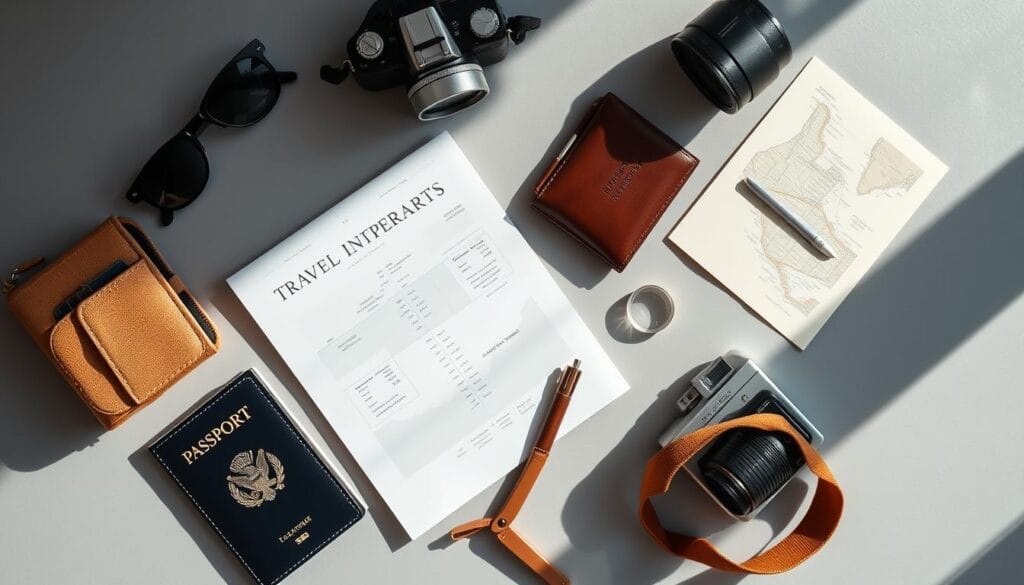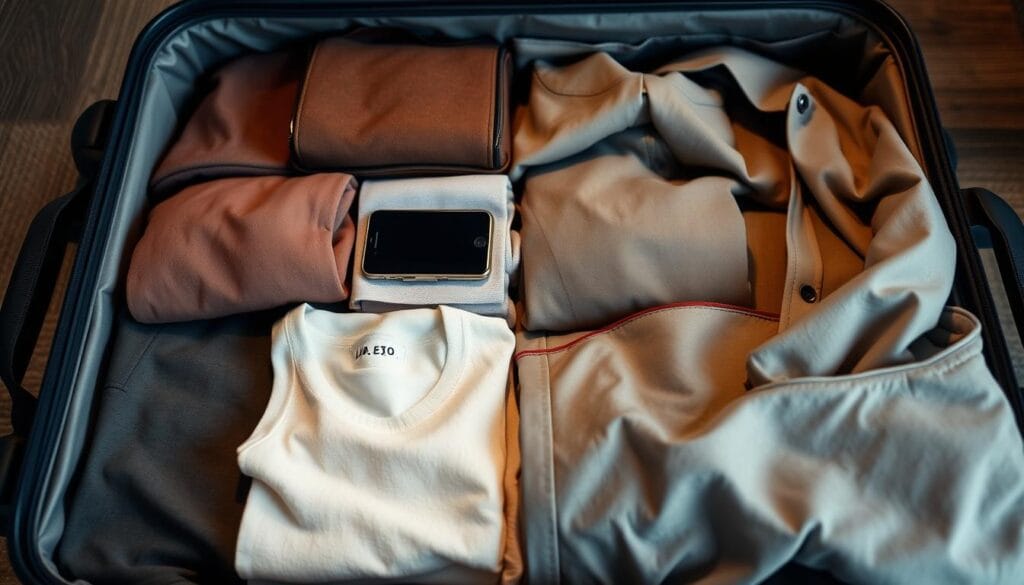Travel Pro: Your Ultimate Guide to Expert Travel Tips
Becoming a travel pro means planning smart and knowing the inside scoop. Your journey to expert travel tips starts here. It turns regular trips into amazing experiences. Whether you’re a seasoned traveler or new to the scene, learning to travel smart can make your trip better.
Getting ready for your trip is key to success. Knowing how to plan your trip can save you time, money, and stress. From checking your passport to packing right, expert tips will help you travel confidently, both at home and abroad.
Table of Contents
Essential Pre-Trip Planning Strategies
As a travel pro, the key to successful adventure travel is planning ahead. Good preparation can make your trip smooth and enjoyable. Knowing the right steps to take before you leave will help you feel confident and ready.

Smart travelers know that being well-prepared is the first step to an amazing adventure. Your pre-trip checklist should include important areas to ensure a great experience.
Passport and Visa Requirements
Managing your passport is essential for any adventure. Here are some key things to remember:
- Check passport expiration dates carefully
- Ensure at least six months’ validity beyond your trip
- Verify visa requirements for your destination
- Confirm available passport pages for entry stamps
Pro tip: Some countries may deny entry if your passport doesn’t meet specific validity requirements.
Travel Insurance Essentials
Travel insurance is more than just an extra—it’s a must-have for safety. When choosing a policy, think about these:
- Coverage for medical emergencies
- Trip cancellation protection
- Emergency evacuation services
- Coverage for adventure activities
71% of travelers believe proper planning enhances their overall travel experience.
Medical Preparations and Vaccinations
Keeping yourself healthy is crucial when traveling abroad. Here’s how to prepare:
- Schedule vaccination appointments 6-8 weeks before departure
- Consult travel health clinics for destination-specific recommendations
- Carry a comprehensive medical kit
- Verify health insurance coverage abroad
By spending time on pre-trip planning, you’ll be ready for an unforgettable adventure. This approach reduces stress and increases the fun of your trip.
Mastering the Art of Packing Light

Packing light is an art that can change your travel experience. It’s key for budget travel, saving money and reducing stress. Minimalist packing means traveling with purpose and flexibility.
Here are some tips for packing light:
- Choose versatile clothing in neutral colors that mix and match easily
- Invest in lightweight, multi-purpose travel gear
- Use compression packing cubes to maximize space
- Wear bulky items during transit to reduce luggage weight
When picking luggage, look for lightweight options like the TravelPro MaxLite, which weighs just 5.4 lbs. Soft-sided bags offer more flexibility and often fit into tight overhead compartments. Choose bags made from durable nylon or canvas materials that can withstand travel challenges.
Smart travelers pack smart. Roll clothes to save space and prevent wrinkles. Wear merino wool clothes, which can be worn multiple times and stay odor-resistant. Consider ScotteVest jackets with multiple pockets for extra storage without extra luggage.
Remember: Every pound counts when you’re a budget travel expert!
Pro tip: Make a detailed packing list to ensure you bring essential items while avoiding unnecessary weight. Focus on versatile pieces that serve multiple purposes and can be mixed and matched throughout your journey.
Travel Pro Rewards and Points Hacking
Discover the world of travel hacking and make your budget travel dreams come true. Credit card rewards programs offer amazing chances to see the world without spending a lot. By smartly managing your credit card miles and loyalty programs, you can cut down your travel costs a lot.
To succeed in travel hacking, it’s important to know how to get the most from your credit card rewards. Here are some key strategies to increase your points:
- Open 3 new travel credit cards per year
- Target welcome bonuses with high point values
- Leverage targeted spending promotions
- Use shopping portals for bonus points
Credit Card Miles Optimization
Picking the right credit cards can change your travel experience. Top cards offer great sign-up bonuses that can quickly add up a lot of points. For example, the Chase Sapphire Preferred gives 60,000 points after spending $4,000 in the first three months. This is worth about $750 in free travel.
| Credit Card | Welcome Bonus | Points Potential |
|---|---|---|
| Chase Sapphire Preferred | 60,000 points | $750 travel value |
| Southwest Rapid Rewards | 85,000 points | Multiple free flights |
| Marriott Bonvoy Boundless | 125,000 points | Several free hotel nights |
Loyalty Program Benefits
Smart travelers know the power of loyalty programs. Transferring points between airline and hotel programs can make your travel rewards go further. Some strategies include:
- Transfer Chase Travel points to Hyatt for high-value redemptions
- Earn Companion Pass with Southwest Airlines
- Use dining rewards programs
Maximizing Sign-up Bonuses
Responsible credit card use is key in travel hacking. Follow these tips:
- Apply for one card every 90 days
- Stay under the Chase 5/24 rule
- Keep your credit utilization low
- Track your minimum spending needs
Pro Tip: With smart strategies, you can earn over 1 million miles a year!
Smart Transportation Choices Abroad
Getting around in a foreign country can greatly affect your trip. Knowing your travel options is key for a successful adventure. Each place has its own transportation challenges and chances that can change your journey.
Here are some important tips for traveling by transport abroad:
- Research local transit systems before departure
- Compare costs between public transportation and rental options
- Understand local transportation etiquette
- Prioritize eco-friendly travel methods
Public transport is often the cheapest and greenest way to travel. For example, Japan’s train system shows how good public transit can make a trip better. Subways, buses, and trains let you see cities and the countryside while being kind to the planet.
Ride-sharing services like Uber and local ones offer flexible travel in many places. Pool options cut down on costs and emissions. Travelers should try different ways to travel to get the most out of their trip and help the environment.
Pro tip: Always carry a local transit map and download transportation apps specific to your destination.
Travelers on a budget can save money by using public transport. It lets you dive into local culture while being eco-friendly. Choosing green transport options saves money and supports responsible travel.
Budget-Friendly Accommodation Strategies
Traveling doesn’t have to be expensive. Smart travelers find ways to save money on places to stay. They choose options that are both affordable and comfortable.
Your choice of where to stay can really cut down on costs. Clever travelers use different tricks to save on lodging:
- Compare booking platforms like Google, Booking.com, and Agoda
- Leverage last-minute deals with apps like HotelTonight
- Explore alternative lodging options beyond traditional hotels
Off-Season Booking Benefits
Booking during off-peak seasons can save a lot of money. Places usually offer 30-60% discounts when it’s not busy. Flexibility is your greatest asset in budget travel.
“The smart traveler sees opportunity where others see inconvenience.” – Travel Expert
Alternative Lodging Options
Look beyond the usual places to stay with creative travel hacks:
- Hostels with dormitory-style rooms
- House-sitting through Trusted Housesitters
- Work exchange programs like Worldpackers
- CouchSurfing for cultural immersion
Loyalty Program Maximization
Hotel loyalty programs can make your travel better. Credit card welcome bonuses can give you free hotel nights. Sites like Hotels.com offer discounts of 10-20% for members, making every booking a chance to save.
By using these strategies, you can save a lot on places to stay. And you’ll have amazing travel experiences too.
Essential Travel Technology and Gadgets
As a travel pro, your tech can make or break your trip. The right gadgets keep you connected, safe, and ready for anything.
Here are some must-haves for today’s traveler:
- Universal Travel Adapter (Epicka): Works in over 150 countries with six charging ports
- Portable Power Bank (Anker Nano): Offers 30W fast charging and supports multiple devices
- Noise-Canceling Earbuds (Bose QuietComfort): Premium sound for $299
- Portable Wi-Fi Hotspot (Simo Solis Lite): Provides 1GB free monthly data
For adventure travel, you need rugged tech. Protect your devices with special cases. Look for gadgets that are light but do a lot.
When choosing travel tech, think about:
- Battery life
- Compact design
- Versatile charging options
- Protective features
Invest in smart tech like the Eufy SmartTrack Link for tracking luggage. Or the SideTrak portable monitor to boost your travel productivity.
Smart travelers know that technology should complement, not complicate, the journey.
Pro tip: Always carry backup charging solutions. Also, consider travel-specific insurance for your devices to ensure a smooth trip.
Cultural Navigation and Local Etiquette
Traveling can be more than just a trip. It can be an experience that dives deep into different cultures. Over 70% of travelers make cultural mistakes because they don’t know the local customs. To travel sustainably, it’s important to respect and enjoy the culture of where you go.
Effective Communication Across Cultures
Good communication across cultures is more than just speaking the language. Here are some tips:
- Learn basic phrases in the local language
- Observe non-verbal communication cues
- Be patient and open-minded
- Use translation apps as a backup
Using local phrases can make you feel more welcome. It helps in making real connections with people.
Navigating Dining Customs
Dining customs vary a lot around the world. What’s polite in one place might be rude in another. Here are some things to keep in mind:
- Research local table manners
- Understand tipping practices
- Learn about traditional eating rituals
- Respect dietary restrictions and local customs
Social Norms and Practices
Knowing about local customs is key for sustainable travel. Each place has its own social rules:
- In Japan, bowing is a sign of respect
- Middle Eastern cultures value hospitality
- European countries have varied personal space norms
- Some African nations have complex greeting rituals
85% of cultural misunderstandings can be avoided with proper research and awareness of local etiquette.
By being culturally sensitive, you make your trip better. You also help in creating deeper connections with people from different cultures.
Conclusion
Becoming a true travel pro is more than just collecting miles or packing well. It’s about being curious, respectful, and caring for the planet. This mindset turns every trip into something special. By using the tips from this guide, you’re ready for amazing global adventures.
Sustainable tourism is more than a trend; it’s a duty for today’s travelers. Your choices can help keep cultures alive, support local people, and protect the environment. As a travel pro, you’ll explore places with care, flexibility, and a true wish to connect with the world.
The skills you’ve picked up are your key to better travel experiences. Whether you’re in busy cities or quiet places, your new knowledge will make you travel smarter and more aware. Every trip is a chance to grow, learn about cultures, and make memories that last forever.
Keep learning, stay curious, and see travel as a chance to change. Your travels are just starting, and with these tips, you’re ready to be a global citizen. You’ll travel with purpose and passion, not just with your luggage.
FAQ
How far in advance should I start planning my international trip?
What are the most important documents I need for international travel?
How can I save money on travel without compromising experience?
What should I look for in a good travel insurance policy?
How can I pack efficiently for a long trip?
What are the best ways to learn about local customs before traveling?
How can I maximize travel rewards and points?
What tech essentials should I bring on an international trip?
How can I travel more sustainably?
What medical preparations are crucial before international travel?
Source Links
- Beginner’s Guide to Using Travel Points and Miles – https://travelpro.ca/blogs/the-travelpro-blog/beginners-guide-to-using-travel-points-and-miles
- Japan Travel Guide: Best Places to Visit in Japan – https://travelpro.com/blogs/the-travelpro-blog/japan-travel-guide-best-places-to-visit-in-japan
- FIVE TIPS TO AVOID OVERPACKING – https://travelpro.com/blogs/the-travelpro-blog/how-to-avoid-overpacking
- The ultimate guide to packing like a pro – https://www.lonelyplanet.com/articles/packing-guide
- trip planning – the ultimate step-by-step guide – Happy Days Travel – https://www.happydaystravelblog.com/trip-planning-a-step-by-step-approach/
- 12 Travel Planning Tips for Epic Journeys (Full Guide) – https://grandgoldman.com/blogs/travel/planning-tips?srsltid=AfmBOoqGtNLq3hkwU3iqcny9C-yxL6gsoMvXZ05AxEmGbP9HmYUHP9QL
- Master the Art of Light Packing: 19 Travel Tips to Outsmart Baggage Fees! — Finding Gina Marie – https://findingginamarie.com/articles/19-tips-to-lighten-up-your-carry-on-bag
- The Art of Carry-On: Travel Light and Smart – Vai Travel – https://www.vaitravel.com/the-art-of-carry-on-travel-light-and-smart/
- Fly High on a Budget: How to Maximize Credit Card Rewards for Travel — Malikah Kelly – https://www.malikahkelly.com/blog/2024/9/19/fly-high-on-a-budget-how-to-maximize-credit-card-rewards-for-travel
- How to Travel for Free Using Credit Card Points for Beginners — Millennial Money with Katie – https://moneywithkatie.com/travel-credit-cards
- How I Earn 1 Million in Frequent Flier Miles Each Year – https://www.nomadicmatt.com/travel-blogs/earn-1-million-miles-per-year/
- How to Become a Sustainable Traveler – https://www.nomadicmatt.com/travel-blogs/sustainable-travel-guide/
- How to Budget for Study Abroad | Seven Corners – https://www.sevencorners.com/blog/study-abroad/how-to-budget-for-study-abroad
- How to Book a Cheap Hotel in 2025 – https://www.nomadicmatt.com/travel-blogs/find-cheap-hotel-room/
- The Best Ways to Get Free/Cheap Accommodation – https://www.theprofessionalhobo.com/the-creative-guide-to-free-or-cheap-accommodation/
- How to Find Cheap & Free Accommodation in 7 EASY Steps – https://www.nomadicmatt.com/travel-tips/finding-cheap-accommodation/
- Our Editors Travel Frequently—Here Are the Travel Gadgets We Swear By – https://www.menshealth.com/technology-gear/g42487333/best-travel-gadgets/
- 12 Travel Tech Essentials to Bring on Every Trip, as Recommended by T+L Editors – https://www.travelandleisure.com/travel-tips/cool-gadgets/essential-travel-tech-gear
- Essential Etiquette Abroad: Navigate Cultural Do’s and Don’ts by Country – https://wowfare.com/blog/navigating-cultural-norms-and-essential-etiquette-tips-for-traveling-abroad-in-different-countries/
- Global Graces: Navigating Social Etiquette Across Cultures and Countries – The Dream Catcher – https://thedreamcatch.com/global-graces-navigating-social-etiquette-across-cultures-and-countries/
- Travel Etiquette: 7 Tips for International Travel Abroad – https://mykameier.com/travel-etiquette-7-tips-for-international-travel-abroad/
- Flight Attendants Swear by Travelpro Luggage — Here Are Our 10 Favorite Pieces We’ve Tested – https://www.travelandleisure.com/best-travelpro-luggage-6741116
- This Roomy Carry-on Is My Secret to Fitting 2 Months of Clothes in 1 Bag — and It’s on Sale – https://www.travelandleisure.com/travelpro-maxlite-air-hardside-carry-on-review-8774184

